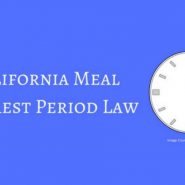
Interestingly, the breaks you take during your workday hold an important place in the state regulations of California. Douglas Han, a legal expert at the Justice Law Corporation, points out, “In California, employees receive a 30-minute uninterrupted meal break per five hours of work (for shifts in excess of six hours) and a 10-minute uninterrupted rest break per four hours of work (or major fraction thereof). It probably surprises many employees that, if Justify with no choice but to work through their breaks, they are actually entitled to one hour of additional pay.”
According to Douglas Han of the Justice Law Corporation, “Working through breaks may not sound like a big issue, but over time it can lead to employees overworking, stress, anxiety, and burnout. Providing employees with the chance to take a break is essential.” Employees should be resting during such breaks, and this is covered in several laws drafted that manage employee welfare at the workplace. Rooted in a history marked by labor rights violations, laws such as these are an essential mechanism to maintain ethical standards throughout businesses and to ensure the well-being and respect of the workers. These regulations have been clearly defined through landmark rulings in California, such as Brinker Restaurant Corp v. Superior Court, which delineates comprehensive employer responsibility standards where it pertains to meal and rest break provisions.
Despite these regulations, many employees find themselves involuntarily working through their designated breaks. Douglas Han of the Justice Law Corporation gives some insight into why this could be occurring when he suggests, “Employees may feel coerced to work through breaks to handle essential business which cannot be accomplished within the confines of regular working hours.” This phenomenon is illustrated by occurrences such as discussions between supervisors or co-workers about work-related topics, requests to get back to work, queuing to re-clock in from lunch breaks, and others.
Taking legal action is one of the possible choices that you can make if you believe that your entitlement to meal/and or rest breaks has been neglected. Before finally engaging a reputable law firm to represent you legally for employer non-compliance with meal and rest break violations, instances must be documented. California’s relentless commitment to upholding workers’ rights underscores just how important it is for employees to speak out if they feel that their employer has been unfair or has taken advantage of them in any way, shape, or form.


